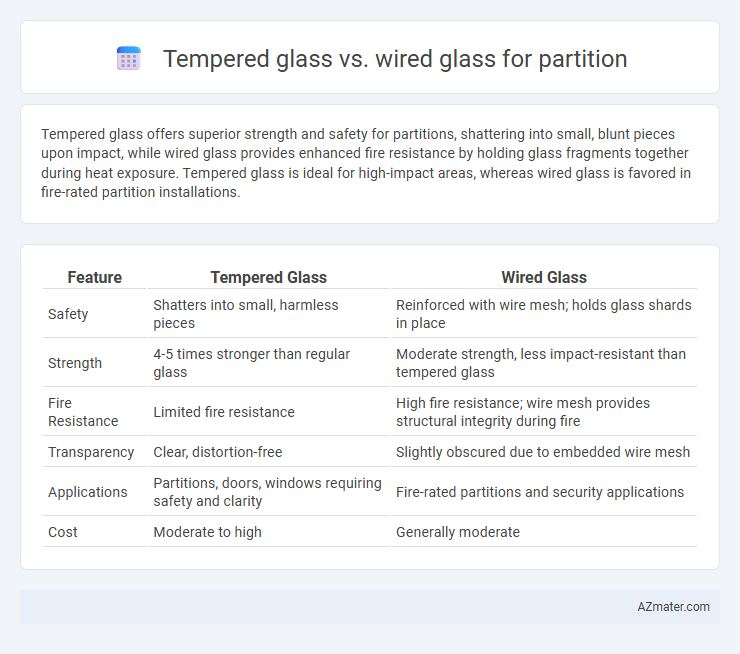Tempered glass offers superior strength and safety for partitions, shattering into small, blunt pieces upon impact, while wired glass provides enhanced fire resistance by holding glass fragments together during heat exposure. Tempered glass is ideal for high-impact areas, whereas wired glass is favored in fire-rated partition installations.
Table of Comparison
| Feature | Tempered Glass | Wired Glass |
|---|---|---|
| Safety | Shatters into small, harmless pieces | Reinforced with wire mesh; holds glass shards in place |
| Strength | 4-5 times stronger than regular glass | Moderate strength, less impact-resistant than tempered glass |
| Fire Resistance | Limited fire resistance | High fire resistance; wire mesh provides structural integrity during fire |
| Transparency | Clear, distortion-free | Slightly obscured due to embedded wire mesh |
| Applications | Partitions, doors, windows requiring safety and clarity | Fire-rated partitions and security applications |
| Cost | Moderate to high | Generally moderate |
Introduction to Glass Partitions
Glass partitions enhance modern interiors by providing openness and natural light while maintaining privacy and sound control. Tempered glass offers high strength and safety through heat treatment, making it resistant to impact and shattering into small, blunt pieces. Wired glass incorporates embedded wire mesh for enhanced fire resistance and structural integrity but lacks the clarity and modern aesthetic of tempered glass, often making it less favorable for contemporary partition designs.
What is Tempered Glass?
Tempered glass is a type of safety glass processed by controlled thermal or chemical treatments to increase its strength compared to normal glass, making it highly resistant to impact, heat, and thermal stress. It shatters into small, blunt pieces rather than sharp shards, reducing the risk of injury in case of breakage, which makes it an excellent choice for partitions requiring durability and safety. Wired glass, embedded with wire mesh for fire resistance, lacks the impact strength and shatter-safety features of tempered glass, making tempered glass preferable for modern partition applications where both strength and safety are priorities.
What is Wired Glass?
Wired glass is a type of safety glass embedded with a metal wire mesh that holds the glass together when shattered, enhancing fire resistance and preventing debris from falling through. Unlike tempered glass, which is heat-treated for strength and shatters into small, blunt pieces for safety, wired glass prioritizes fire protection and maintains structural integrity under high temperatures. Wired glass is commonly used in partitions where fire safety regulations are critical, such as stairwells and fire-rated enclosures.
Strength and Durability Comparison
Tempered glass offers superior strength with a tensile strength approximately four to five times greater than wired glass, making it highly resistant to impact and breakage. Wired glass, reinforced with embedded wire mesh, provides enhanced fire resistance and maintains structural integrity under high heat but is more prone to shattering upon impact. In terms of durability, tempered glass withstands daily wear and stress better, while wired glass excels in fire-rated applications due to its ability to hold fragments together when exposed to flames.
Safety and Impact Resistance
Tempered glass offers superior safety and impact resistance compared to wired glass, as it shatters into small, blunt pieces rather than sharp shards, reducing injury risk during breakage. Its enhanced strength allows it to withstand higher impact forces, making it ideal for partitions in high-traffic areas. Wired glass, while providing some resistance to shattering due to embedded wire mesh, tends to break into large, dangerous fragments, posing greater safety hazards.
Fire Resistance and Compliance
Tempered glass offers moderate fire resistance but typically does not meet strict fire safety codes, making it less suitable for partitions requiring compliance with fire rating standards. Wired glass, embedded with a metal mesh, provides superior fire resistance by maintaining its integrity and preventing fire and smoke passage, ensuring compliance with building regulations for fire-rated partitions. Choosing wired glass for partitions enhances safety and meets legal fire compliance standards essential in commercial and industrial buildings.
Aesthetic Differences
Tempered glass partitions offer a sleek, modern aesthetic with clear, smooth surfaces that enhance natural light flow and create an open, airy feel in interiors. Wired glass, characterized by its embedded metal mesh, provides a textured, industrial look that adds visual interest while offering a vintage or security-focused design element. The choice between tempered and wired glass influences the overall ambiance, with tempered glass complementing contemporary styles and wired glass catering to rustic or utilitarian decors.
Cost Analysis
Tempered glass partitions typically cost between $25 to $40 per square foot, offering enhanced strength and safety with higher upfront investment. Wired glass is generally less expensive, averaging around $15 to $25 per square foot, but it may lack the same level of impact resistance and aesthetic clarity. Cost analysis should also consider installation expenses, maintenance, and compliance with fire safety standards, where wired glass often has an advantage.
Installation and Maintenance
Tempered glass partitions offer straightforward installation due to their uniform thickness and lightweight properties, requiring standard fittings and minimal structural support, while wired glass demands careful handling to avoid wire mesh damage and often needs specialized framing systems. Maintenance of tempered glass is simpler as it resists scratches and can be cleaned with standard glass cleaners without risk of damaging embedded materials, whereas wired glass requires cautious cleaning to prevent corrosion or deterioration of the wire mesh and may need frequent inspections for wire integrity. The durability and ease of replacement make tempered glass a preferred choice for partitions where quick installation and low maintenance are priorities.
Best Applications for Each Glass Type
Tempered glass offers superior strength and safety, making it ideal for office partitions, shower enclosures, and areas requiring high impact resistance and clarity. Wired glass provides enhanced fire resistance and prevents glass from shattering, best suited for fire-rated partitions, stairwells, and industrial environments. Selecting tempered glass maximizes durability and aesthetics, while wired glass ensures safety and compliance with fire codes.

Infographic: Tempered glass vs Wired glass for Partition
 azmater.com
azmater.com